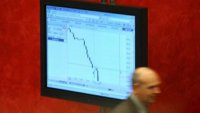www.aljazeerah.info
News, February 2012
Archives
Mission & Name
Conflict Terminology
Editorials
Gaza Holocaust
Gulf War
Isdood
Islam
News
News Photos
Opinion Editorials
US Foreign Policy (Dr. El-Najjar's Articles)
www.aljazeerah.info
|
Editorial Note: The following news reports are summaries from original sources. They may also include corrections of Arabic names and political terminology. Comments are in parentheses. |

France’s GDP grew by 1.7% in 2011, according to official figures published on Wednesday, but steep budget cuts in neighbouring Italy pushed the country's debt-ladden economy back into recession.
France 24, February 15, 2012
REUTERS -
Germany's economy contracted slightly in the fourth quarter but both it and France, which eked out anaemic growth, performed better than forecast suggesting the euro zone may skirt a recession even though its high debtors remain deep in the mire.
German gross domestic product contracted 0.2 percent, a
slowdown from upwardly revised 0.6 percent growth in the
July-September period, data showed on Wednesday.
France
fared better, growing by a stronger-than-expected 0.2 percent in
the fourth quarter from the previous three months as companies
invested more and consumers continued to spend.
Figures for the euro zone as a whole are due at 1000 GMT and forecast to show its economy slipped by 0.3 percent quarter-on-quarter although that could now come in stronger.
Germany's figures were a little better than forecast and more forward-looking survey evidence suggests its downturn will be short-lived.
The ZEW think tank's monthly poll of economic sentiment jumped for the third month in a row on Tuesday, to its highest level since April 2011, reinforcing signs that Europe's largest economy is returning to growth.
"The first economic contraction since the end of the recession turned out to be weaker than expected, confirming that the German economy only took a growth pause and is not approaching a new recession," ING's Carsten Brzeski said.
France's economy also beat expectations that it would shrink by 0.1 percent, growing by 0.2 percent, and economists said it too might avoid recession - defined as two consecutive quarters of negative growth.
"We may see a contraction in the first quarter, but we already have indicators pointing to a recovery from the second quarter onwards," said Michel Martinez, chief France economist at Societe Generale in Paris.
Late last year, European Central Bank President Mario Draghi forecast a mild recession for the currency bloc. His latest assessment, given at a news conference following a monetary policy meeting last week. was that there was evidence of "a stabilisation of economic activity at a low level".
Finland posted quarterly growth of 0.7 percent. The exception in the northern half of the currency bloc was the Netherlands which subsided into recession, shrinking by 0.7 percent, following a third-quarter contraction of 0.4 percent.
"The country data released so far this morning suggest that euro zone GDP contracted by rather less than expected in Q4 last year." said Jonathan Loynes, Chief European Economist at Capital Economics. "Coupled with the recent improvement in some of the leading indicators, that may raise hopes that the region will expand again in Q1 and hence avoid a technical recession."
Peripheral misery
Even if the euro zone avoids recession, for its members at the epicentre of the debt crisis there is no chink of light.
Italy's economy contracted a steeper than expected 0.7 percent in the final part of last year, throwing the country into a recession expected to last for much of 2012.
The International Monetary Fund forecasts a full-year contraction of 2.2 percent in 2012, while the Bank of Italy sees a more modest decline of 1.2-1.5 percent. The government still has an official projections of -0.4 percent, considered unrealistic by all independent forecasters.
With wrangling over a second Greek bailout still unresolved, data on Tuesday showed Greece's economy shrank by a stunning 7 percent year-on-year in the fourth quarter, much worse than a Q3 decline of 5 percent. The austerity measures demanded by its lenders are likely to make things even worse.
The latest figures also make it that much harder to reach its debt targets, calling into question the wisdom of cutting so deeply.
Euro zone finance ministers have dropped plans for a special face-to-face meeting on Wednesday on Greece's new international bailout, saying political party chiefs in Athens had failed to provide the required commitment to reform.
Portugal, which many analysts expect to require bailing out for a second time too, suffered a 1.3 percent quarterly contraction in GDP, more than double the previous quarter's 0.6 fall.
French trade deficit hit record €69.6 billion in 2011
France’s trade deficit reached a record €69.6 billion in 2011, despite good export figures in the aeronautics sector, French junior minister for Trade Pierre Lellouche (pictured) said in an interview published Tuesday.
AFP - France suffered a record 69.6 billion euro ($91.3 billion) trade deficit last year, junior minister for trade Pierre Lellouche said in a newspaper interview Tuesday.
However, Lellouche told the Figaro daily, while the figure is higher than the previous record deficit of 56.2 billion euro recorded in 2008 it was nonetheless "lower than had been anticipated."
Last month Lellouche revised down an original estimate of a 75 billion euro trade deficit.
In 2011 France's imports rose by 11 percent to 498 billion euros while exports rose by 8.6 percent to 429 billion euros, allowing for the creation of 90,000 new jobs, he told the Figaro.
"We can be satisfied at the good results in certain sectors, the agro-food sector saw a historic surplus of 11.4 billion (euros). Aeronautics also saw a surplus, of 17.7 billion, thanks to the sale of 534 Airbus planes," Lellouche said.
However French exports rose less last year than in Germany, Britain, Spain, Italy or the United States.
France's global trade share has fallen sharply since
1990 from 6.2 percent to 3.6 percent.
Fair Use Notice
This site contains copyrighted material the
use of which has not always been specifically authorized by the copyright
owner. We are making such material available in our efforts to advance
understanding of environmental, political, human rights, economic,
democracy, scientific, and social justice issues, etc. We believe this
constitutes a 'fair use' of any such copyrighted material as provided for
in section 107 of the US Copyright Law. In accordance with Title 17 U.S.C.
Section 107, the material on this site is
distributed without profit to those
who have expressed a prior interest in receiving the included information
for research and educational purposes. For more information go to: http://www.law.cornell.edu/uscode/17/107.shtml.
If you wish to use copyrighted material from this site for purposes of
your own that go beyond 'fair use', you must obtain permission from the
copyright owner.
|
|
|
|
||
|
||||||



